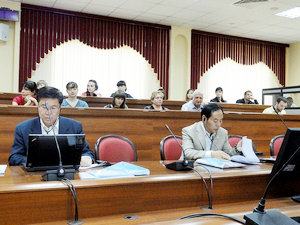AGS Participates in International Higher Education Conference in Russia |
| Thursday, 14 June 2012 |
|
Representing AGS, Professor Yates presented a paper entitled “The Guéant Memorandum: What are the Effects on Internationalization of Higher Education?”. Yates's paper focused on the memo issued in May 2011 in France by then Minister of the Interior Claude Gueant, which ordered French administration to scrutinize more closely international students in France seeking to change their status to permanent residency. The memo was highly criticized by the public for being nationalistic and by higher education professionals for countering their efforts to internationalize French universities. The memo is no longer in effect but illustrates the power of politics on higher education. Other presentations discussed such issues as the international ranking systems, resource sharing among universities around the world and the importance of institution relationships, as well as specific country cases such as the shift from the elite model to a "mass" educational system in Russia, or the internationalization of private education in China and the role of the government. Arcadia University Provost and Vice President for Academic Affairs Steve Michael provided the driving force behind the debates by asking what type of university we need in the 21st century. Starting with the definition of a university given by the late Cardinal Newman (one of the founders of Cambridge University) as a “physical place,” an “assembly of strangers,” a “school of universal learning,” dedicated to “knowledge and truth,” and one that produces “gentlemen, statesmen and scientists,” he then proceeded to show how that original model had become outdated. The university is no longer a physical place, as online enrollment has risen from 9% to 26% in recent years.There is a push for specialization and career-orientation, and a “massification” of higher education that has all but eliminated the old model of producing elites. A combination of technology and globalization is now creating a need for what he called “global scholars,” i.e.culturally diverse, multilingual transnationally experienced, mobile, and crossculturally competent. He then asked what kind of university could produce such global scholars. “Only a university with a global mission, a global curriculum, a global faculty, and global students, one that offers joint-degree programs, dual-degree programs, and major abroad programs.” Last year's GAUC conference was hosted at Xi'an University in China, and next year's will be at Danubius University in Romania. See more picture of the conference: |

 On 23-25 May 2012, AGS participated in the 2nd International Conference of GAUC (Global Advancement of Universities and Colleges) at Voronezh State University, Russia. Started on the initiative of Arcadia University, this organization promotes internationalization of higher education to prepare global citizens and leaders. As part of its mission it organizes a yearly conference that brings together scholars, administrators, and students from universities around the world to discuss the challenges of globalization of higher education and foster transnational collaboration and relationships.
On 23-25 May 2012, AGS participated in the 2nd International Conference of GAUC (Global Advancement of Universities and Colleges) at Voronezh State University, Russia. Started on the initiative of Arcadia University, this organization promotes internationalization of higher education to prepare global citizens and leaders. As part of its mission it organizes a yearly conference that brings together scholars, administrators, and students from universities around the world to discuss the challenges of globalization of higher education and foster transnational collaboration and relationships.







 AGS has not only introduced and allowed me to explore the ideas of the scholars in the field, but also to explore my own ideas in the hopes that they become a part of the larger discipline.
AGS has not only introduced and allowed me to explore the ideas of the scholars in the field, but also to explore my own ideas in the hopes that they become a part of the larger discipline.